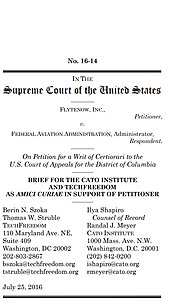Learn more about Cato’s Amicus Briefs Program.
Last year, a company called Flytenow was poised to revolutionize air travel by allowing private pilots already going to a destination to share their costs with would-be travelers — kind of like a college rideshare bulletin board, but on the internet. The service would pair pilots with potential passengers, for a small fee no greater than the cost of fuel. It’s been called “Uber in the sky.” But in December, Flytenow shut down after the U.S. Court of Appeals for the D.C. Circuit upheld the Federal Aviation Administration’s determination that the service must obtain the highest levels of licensing, akin to what major airlines and their pilots secure. The FAA decided that these pilots were not simple private individuals sharing cost, but were “common carriers,” subject to heightened liability and expensive professional licensing. Common carriers — like buses, trains, and commercial airlines — have been treated specially in the law since medieval times, and they differ from Flytenow’s online bulletin board. As Flytenow seeks review in the Supreme Court, Cato Institute, joined by TechFreedom, has filed an amicus brief in support. First, “common carriage” is a term defined by common law, stretching back to way before the founding of the FAA — indeed hundreds of years before the Wright Brothers — and the FAA’s interpretation here directly contravenes that established meaning. One glaring consistency across the last 600 years of common law is that the carrier must hold itself out for indiscriminate public hire. Flytenow pilots, as a matter of right, can turn down any passenger for any reason (or no reason) and thus are by definition not common carriers. This alone is reason enough to reverse the court’s decision and overturn the FAA ruling. But second and more basically, the D.C. Circuit granted very broad deference to the FAA’s interpretation of what constitutes common carriage, despite that being a term defined at common law. Courts often defer to an agency’s expertise in a particular subject matter — which essentially means that the agency’s decision is usually upheld under some “deference” framework. But according to the Supreme Court’s ruling in Texas Gas Transmission Corp. v. Shell Oil Co. (1960), when an agency interprets the common law, a reviewing court shouldn’t simply defer to the agency’s interpretation. That makes perfects sense: there is no greater expert in the common law than the courts, and the FAA lacks the expertise to engage in judicial decision-making. But instead of applying any existing law on the negligible deference that is due to agencies interpreting common-law terms, the D.C. Circuit went off on a doctrinal frolic entirely of its own invention. The lower court thereby not only contravened Texas Gas, but also went far beyond what little latitude any other circuit court had given agencies interpreting common-law terms. By doing so, the court plainly delegates to the FAA what is “the province and duty of the judicial department,” which is to “interpret” the common law and “say what the law is.” Marbury v. Madison (1803). Such a delegation offends constitutional order and the separation of powers. Because the D.C. Circuit has neatly packed an abdication of the judicial role into a decision that contravenes 600 years of established law, we urge the Supreme Court to take up the case.
